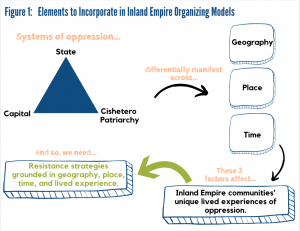Written by The Lewis Lemon Committee for Revolutionary Abolition
The past year has been one of the most explosive in history. For Rockford anarchists and revolutionaries (old and new), we were amazed and overwhelmed by the militancy, mass participation and energy over the past year. A group of comrades wrote this analysis about 2020 and the revolutionary movements in Rockford over the last decade as a whole. Our analysis is not focused entirely on the uprising as in previous pieces written such as Notes from the Rockford Rebellion as we felt there were other important developments within the radical milieu over the course of 2020 in Rockford that were not tied directly to the uprising. By revolutionary, we mean that we want to see an end to racial capitalism and the State. We want an end to this anti-black settler-colonial world. We want to abolish the present state of things. We want communism and anarchy. Communism for us means a set of social relations where we are free and without needless hierarchy. We want a free and classless way of life. That is our goal. The revolutionary movements in Rockford we discuss in this text helped to develop strategies towards communism.
Rockford is a small city with an nascent left let alone anarchist or revolutionary milieu. We find these analyses are helpful for us to develop better strategies to fight back against racial capitalism and the State. The document is a product of conversations and collaboration between a variety of revolutionaries in Rockford. Small cities are not typically the focus of revolutionary analyses and strategy. We were inspired by previous things written in 2020 about Rockford movement, so a group of us who have been struggling together decided to create this text. Creating a regional analysis inspired by communism-anarchism and a variety of autonomous revolutionary traditions (such as Zapatismo or Black Radical Feminism) is important to us as it helps grounds our politics in the material and strategic reality of our area. The text also allows a better entry into our politics, as many new militants are not currently politicized here with a theoretical orientation. This document is meant to provide history, analysis, and suggestions about revolutionary practice and strategy in our area.
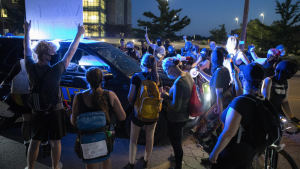 History
History
The history in Rockford is critical to relay so people who have entered the movement during 2020 can understand the contexts that revolutionaries have been struggling in over the past ten years.
The primary struggles in Rockford that have generated the most popular support in the community over the past ten years have been the mass struggles against the police and economic inequality. We chose these struggles as they show the central intersection of racial domination and class exploitation in Rockford and how radical movements have failed to grapple with these contradictions. While there have been moments of mobilization against racism and police brutality over the past ten years, they lacked an emphasis on class analysis as it relates to racialization. While at the same time, the seemingly class conscious Occupy protests were reductionist in how they approached the intersections of domination. Furthermore, movement participants struggled to develop a clear analysis of the role of the State within racial capitalism. All of this was compounded by the lack of strong radical organizations, affinity and collectives.
We feel that the protests around socio-economic inequality were most active during the Occupy Rockford movement. The importance of the Occupy movement was the focus on the capitalist and financial classes’ exploitation and the class system within our society. Additionally, the Occupy movement emphasizes how the political system was thoroughly controlled by capitalists. While we find that class analysis is essential for developing any revolutionary movement, black participants within the Occupy Rockford movement were often marginalized by the white participants through microaggressions and acts of outright racism. Furthermore, most of the Occupy Rockford participants were class reductionists. Much of the Occupy movement’s time in Rockford was spent trying to engage with the Tea Party. The Tea Party was a reactionary formation within the Republican Party that was active at the time. These Tea Party activists have subsequently transformed into the fascist street movement which stormed the capitol on January 6th. It is critical that we smash fascism in the streets rather than tolerating it. In many Occupy camps across the country, fascist participants were chased out rather than tolerated. However, this did not happen in Rockford as some Occupiers spent time trying to engage with the Tea Party members. Most of the Occupiers went on to burn out or organize within the Democratic Party for personal career opportunities. Additionally, much of the Occupy energy from the liberal wing predictably went into local “progressive campaigns” as well as the Sanders campaigns in 2016 and 2020 which served to undermine the few efforts at autonomous political action.
The anarchist and autonomous political roots of the Occupy movement were for the most part marginalized because there was no camp or assemblies. There was a division between the liberal wing of the Occupy Movement who essentially wanted to be the Left wing of the local Democrats (this faction eventually lead the Sanders campaign in 2016 but has remained marginal mostly in terms of political influence locally) which contrasted with the more anarchist wing of the Occupy Rockford movement which was based mostly in the punk house “Disastr House” on the West Side. Although punk can be a way to introduce anarchist politics, it cannot be the basis of an anarchist political movement. In many ways, the anarchists of Disastr House were not taken seriously as a result of the association of anarchism with the subcultural punk movement. This differed from Occupy movements across the country which had anarchist politics that were grounded in historical traditions of class struggle and in some cases anti-racism and abolition. The electoral opportunism and subcultural politics are part of the reason that autonomous movements in Rockford have struggled to develop. Despite this, many militants taking part in contemporary struggles were politicized through their interactions with social democratic wing of the Occupy movement as well as the anarchist wing.
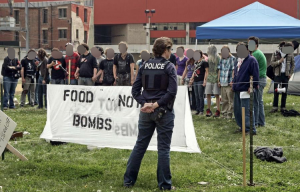 The movement against the police in Rockford emerges after the murder of Mark Barmore in 2009 at the Kingdom Authority Baptist church. The potential for rebellion was stifled by Jesse Jackson and the local Black counter insurgency. In the following years, there were more murders of black people by the police and private security which lead to a variety of protests which remained relatively peaceful compared to the rebellion we saw this summer in Rockford. In many ways, these protests were moderated by the white and black liberals who worked closely with the Rockford Police Department. The few attempts at black autonomous organization were often stifled through threats and repression. It was very easy for the black middle class such as the NAACP to opportunistically use the deaths of black people in the community at the hands of the police to boost their own political careers in the city. Black middle class opportunists obscured their own roles in maintaining the power of the police which so it was difficult to build a movement that was resilient to back electoral and middle class opportunists. This is why we believe that class analysis is so critically important. Male pastors tended to dominate the leadership which marginalized the leadership and agency of black women as movement participants. In terms of the Occupy Rockford, the more liberal wing did not want to have anything to do with black organizing efforts against the police (as they felt it took away from their message) while the anarchist wing based out of Disastr House was labeled by the black counter-insurgency as “troublemakers”. An alliance between anarchists and black radicals against the police (as it has developed in some cities) could have lead to a more militant and mass based movement but that did not happen. This was a missed opportunity which can be attributed partially to the subcultural politics of the mostly punk-based anarchist movement which tends not to be concerned a larger political strategy against racial capitalism.
The movement against the police in Rockford emerges after the murder of Mark Barmore in 2009 at the Kingdom Authority Baptist church. The potential for rebellion was stifled by Jesse Jackson and the local Black counter insurgency. In the following years, there were more murders of black people by the police and private security which lead to a variety of protests which remained relatively peaceful compared to the rebellion we saw this summer in Rockford. In many ways, these protests were moderated by the white and black liberals who worked closely with the Rockford Police Department. The few attempts at black autonomous organization were often stifled through threats and repression. It was very easy for the black middle class such as the NAACP to opportunistically use the deaths of black people in the community at the hands of the police to boost their own political careers in the city. Black middle class opportunists obscured their own roles in maintaining the power of the police which so it was difficult to build a movement that was resilient to back electoral and middle class opportunists. This is why we believe that class analysis is so critically important. Male pastors tended to dominate the leadership which marginalized the leadership and agency of black women as movement participants. In terms of the Occupy Rockford, the more liberal wing did not want to have anything to do with black organizing efforts against the police (as they felt it took away from their message) while the anarchist wing based out of Disastr House was labeled by the black counter-insurgency as “troublemakers”. An alliance between anarchists and black radicals against the police (as it has developed in some cities) could have lead to a more militant and mass based movement but that did not happen. This was a missed opportunity which can be attributed partially to the subcultural politics of the mostly punk-based anarchist movement which tends not to be concerned a larger political strategy against racial capitalism.
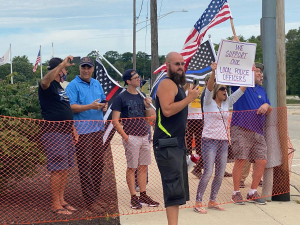 One of the major failures over the past ten years within the Rockford movement has been to establish long lasting radical organizations, collectives and affinity groups that could organize with a radical political strategy in mind. To a large degree, this has to do with the lack of political education internal to the radical environment which led participants to not recognize why building long term radical formations was critical. This lack of radical organizations in Rockford led to a mostly informal mobilization-based culture driven by a few charismatic individuals rather than long-term movement building. The few organizations that did emerge were plagued with informal hierarchies and oppressive dynamics, such as anti-blackness and transphobia, that remained unaddressed until it led to these organizations fracturing. Many of us failed to create solid internal organizational structures for these groups which lead to a lack of accountability. Within these radical spaces, certain white petty-bourgeois people prioritized their own careers and academia ahead of movement building and direct confrontation with the State. The dominance of these petit-bourgeois attitudes created an opposition to militant direct action which ultimately hindered the building of robust movements in the city. Instead, much of the energy was funneled into “dual power” and solidarity economy projects. However, these projects were plagued by a lack of connection to mass movements against local class enemies such capitalists, landlords and police. The lack of a connection to struggle against the State and Capital by radicals is a major reason that the radical scene has remained mostly marginal and small. Instead of supporting and catalyzing mass movements in the city, the lack of an effective strategy meant that the radical spaces remained a social scene for the most part.
One of the major failures over the past ten years within the Rockford movement has been to establish long lasting radical organizations, collectives and affinity groups that could organize with a radical political strategy in mind. To a large degree, this has to do with the lack of political education internal to the radical environment which led participants to not recognize why building long term radical formations was critical. This lack of radical organizations in Rockford led to a mostly informal mobilization-based culture driven by a few charismatic individuals rather than long-term movement building. The few organizations that did emerge were plagued with informal hierarchies and oppressive dynamics, such as anti-blackness and transphobia, that remained unaddressed until it led to these organizations fracturing. Many of us failed to create solid internal organizational structures for these groups which lead to a lack of accountability. Within these radical spaces, certain white petty-bourgeois people prioritized their own careers and academia ahead of movement building and direct confrontation with the State. The dominance of these petit-bourgeois attitudes created an opposition to militant direct action which ultimately hindered the building of robust movements in the city. Instead, much of the energy was funneled into “dual power” and solidarity economy projects. However, these projects were plagued by a lack of connection to mass movements against local class enemies such capitalists, landlords and police. The lack of a connection to struggle against the State and Capital by radicals is a major reason that the radical scene has remained mostly marginal and small. Instead of supporting and catalyzing mass movements in the city, the lack of an effective strategy meant that the radical spaces remained a social scene for the most part.
In general, there has been a lot of pessimism amongst Rockford revolutionaries towards movement building over the past ten years. This led to a lot of resentment, distrust, and anger within radical circles. The attitude within Rockford radical spaces was often that “radical organizing is happening elsewhere”. The immense task of building the radical infrastructure in Rockford to many seemed an impossible task. Often times instead of trying to organize events in Rockford, people would go to larger cities. In fact, many people left Rockford to organize in Chicago and other major cities who had already developed infrastructure. These attitudes are counter-revolutionary and idealistic. There cannot be a commune realistically in the Midwest without connections between major metropolitan areas, small cities like Rockford, and the rural areas that surround small cities. Autonomy, in a way that is meaningful, will mean massive regional networks around food and production. The pessimistic attitudes towards possibilities of radical organizing in Rockford led to the weakness of the relationships formed between revolutionaries as well as our relationships with the communities we exist within. Many revolutionaries, with self-proclaimed radical orientation saw compromising and working with Democrats as a good strategy because “radical organizing couldn’t happen in Rockford”. It was there hope that by doing this they would not “alienate” anyone. People were content to hope that Bernie or some politician would win then fix it rather than taking action against oppressive forces ourselves. The electoral strategy is opposed to building radical cultures and communities outside of those already state-approved channels. Instead, we must focus our energy on building strong, militant, and resilient autonomous movements in our city against racial capitalism.
Strengths, Highpoints and Accomplishments
We want to highlight a number of things since there were many victories worth celebrating in 2020. First, the most amazing thing that happened over the course of 2020 was the heightened intensity of direct action. The scale and militancy of the rebellion on the weekend of May 30th was something unseen in recent Rockford history. During that weekend of revolt nationwide, Rockford (mostly black and brown youth) took to the streets. They fought police, vandalized District 1, damaged police vehicles, and expropriated goods across the city. This sudden revolutionary fervor was an inspiration to many revolutionaries here though we felt unprepared for the scale and intensity as we had never seen anything like that in Rockford before. For many comrades that was the highlight of the past year. We want to be clear however that although many of the marches and protests after the rebellion were symbolic, movement participants had a new understanding of what direct action is. Numerous actions disrupted the flow of capital, attacked State institutions, contested the monopoly on violence the Rockford police enjoy, and scared politicians out of their homes. Finally our comrades felt that the May Day demonstration prior to the rebellion, where families of prisoners inside of Winnebago County Jail drove their cars around outside of the jail to protest conditions was really powerful and very different tactically than anything we had seen in Rockford up to this point.
Following the #TyrisJones shooting, demonstrations resumed during which militants threw fireworks at the jail, graffitied state property and blocked roads with barricades. The use of car tactics in the massive demonstrations, following May 30th, to shut down large city streets such as East State and Forest City Plaza was another exciting development locally in terms of tactics. Although we have critiques of the City Market demonstrations, we found that the first protests that disrupted City Market, a key site of gentrification in downtown Rockford, was a valuable tactic as it directly targeted capital and whiteness. For many long time Rockford organizers, disrupting City Market had been a goal and we were happy to the spell of “development” broken. One comrade has remarked that simply the number of non-permitted autonomously organized marches that happened was a big success in their eyes as previous to this summer, that was a rarity in Rockford.
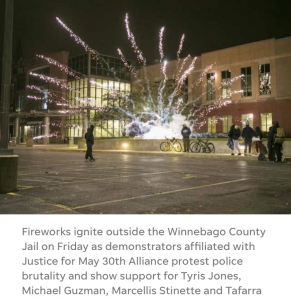 We felt that the relationship building that happened internal to the movement over the course of the past year seemed to be some of the best that happened in our memories. Much of this relationship building happened informally during actions, and we found that building relationships through creating affinity groups, collectives and organizations was prioritized by radicals throughout the city. At the time of writing, there are several radical organizations and collectives, with a variety of different politics and goals, that have emerged out of the rebellion and the pandemic. We hope that these organizations and collectives continue to organize amongst themselves and build long lasting relationships. We need more specialization and decentralization in our movement. Our movement is propelled by the strength of the relationships that we have with our comrades and our larger communities. While we do not feel that everyone needs to be friends (in fact we are critical of friendship as the sole basis for political affinity), we do feel that deepening relationships and trust with those who you share political affinity is necessary step towards building strong radical movements.
We felt that the relationship building that happened internal to the movement over the course of the past year seemed to be some of the best that happened in our memories. Much of this relationship building happened informally during actions, and we found that building relationships through creating affinity groups, collectives and organizations was prioritized by radicals throughout the city. At the time of writing, there are several radical organizations and collectives, with a variety of different politics and goals, that have emerged out of the rebellion and the pandemic. We hope that these organizations and collectives continue to organize amongst themselves and build long lasting relationships. We need more specialization and decentralization in our movement. Our movement is propelled by the strength of the relationships that we have with our comrades and our larger communities. While we do not feel that everyone needs to be friends (in fact we are critical of friendship as the sole basis for political affinity), we do feel that deepening relationships and trust with those who you share political affinity is necessary step towards building strong radical movements.
Finally, the emphasis on political education and theorization was a major improvement in the movement over the past year. A noticeable emphasis was placed on education within formal organizations, radical spaces, and informal organization. Numerous actions we attended had explicit calls for political education alongside zine distros. At the beginning of 2020, there were discussions about how the lack of attention to radical political analysis in our region had led to stagnation of radical politics. We have been pleased to see more attention to local radical history, such as the history of the Rockford Black Panther Party, as well as more written analysis about our region over the course of the past year. Numerous strategy and reading sessions about abolition, revolutionary strategy, and anarchy occurred which were deeply critical. Our hope is to see more groups creating internal education to their group in an effort to develop a clearer political analysis of our city’s reality. In the coming years this needs to be intensified especially in regard to comradely self-reflection.
During the height of the protests around #TyrisJones, radicals build relationships with his family and organized alongside them. Organizing with directly impacted people is critical. The organizing alongside prisoners inside of Winnebago County Jail was another deeply important development of this year. We hope to see more of that in the future. Finally, it is important for there to be personal boundaries within radical communities. Over the course of the past year, organizational and personal boundaries were a major priority for radicals in the area and we hope to see people continue to respect and think about inter-personal dynamics. Understanding personal boundaries is critical especially when dealing and preventing harm and abuse in our spaces. Through every jail support, reading group, revolutionary gardening workday, and de-arrest, we built a closer relationship with our comrades. We feels that finally the foundations of radical infrastructure are starting to take shape in Rockford.
Weaknesses and Criticism
The three primary criticisms that emerged repeatedly within our conversations were the presence of activist/clout chaser personality types dominating movement spaces, symbolic protests with little substance, and the divide between radicals and the larger Rockford community.
A lot of the movement work this summer and overall in Rockford has been centralized around charismatic people. This is our critique of the clout chaser dynamic especially as radicals interested in deconstructing hierarchy. We feel that this dynamic is central to many of the criticisms internal to radicals doing movement building in Rockford. We feel that this clout chaser dynamic has only been exacerbated by social media which uplifts particular personalities based on an algorithm. The social media centered activism has lead to a toxic culture where people who are not constantly “out there” in a physical sense are often shamed for not being “radical enough”. A dynamic like this emerged at the City Hall Occupation after the police shooting of Tyris Jones where people who did not participate were perceived as “less radical” or not “going as hard”. This was particularly problematic as it has effectively silenced critiques of movement tactics that were ineffective. The critique is ableist as being “out there” through supporting demonstrations is not the only actions or way to participate in a movement. We feel that to a large degree that the charismatic personalities dominating has to do with oppressive gendered dynamics internal to the movement spaces where critical labor is done by women and oppressed genders while it remains invisible and unacknowledged. Men have taken up a lot of space and media attention during actions while not doing many other types of tasks. The problem of misogyny in radical spaces needs to be confronted in Rockford. There are men who are still allowed in movement spaces despite being creepy and exhibiting sexual predatory behavior towards comrades and minors. Revolutionaries in Rockford must not tolerate this in any form overt or not.
We tend to feel that many of the actions in 2020 have been completely symbolic. As we mentioned earlier, we supported City Market protests initially but upon reflection, those protests remained completely symbolic, non-violent, devoid of a larger strategic goal and resulted in needless arrests. Though the authors of the document have varying experiences with the actions at City Market in terms of participation and consequences for that participation, we felt that the post by the group Rockford Radical Abolitionists for Change was particularly insightful about those protests.
“There were avoidable mistakes made. These mistakes have led to the predicament we are in now. Multiple nonviolent protestors who are being targeted by the police and the “justice” system are at risk of losing their freedom due to the way police handled the situation AND there being a lack of diverse tactics to respond with. Every week it was to be expected that there would be brutality and excessive force used by the police and at times it felt as if the collective were waiting for it to happen instead of taking control of the action by working together.”- Rockford Radical Abolitionists For Change
While we disagree with the qualification of protestors as non-violent, which seems to be a supposed attempt to set them apart from the “violent” protestors, we think this analysis is very spot on. We agree that the lack of diverse tactics was a problem, we attribute this back to the loudest people in the movement getting attention and dictating tactics on the ground.
Tactics must be changed when they are clearly ineffective. Instead of symbolic protests centered on politicians , revolutionaries should be putting their energy towards organizing along class lines. We need to be present in neighborhoods, workplaces, and homes. The basis of a revolutionary movement is building a strong base of support within communities. We must organize with the intent to grow power and education in our communities rather than to make symbolic gestures with hope that politicians will “hear” us. That is not a revolutionary strategy.
The divorce between the radicals and the community has been a big issue. The failure to contest this clout chasing tendency has led to a lot of problems internal to the movement with certain “activists” not wanting to take critique and change their behavior. This led to certain individuals with clout begin to police tones and actions. Some of our comrades felt that the demonstrations at City Market had become white spectacle that was unconnected to the realities of black people on the West Side dealing with the everyday violence of the police. This was voiced when revolutionaries talked to people in the community. However, due to the activist mentality, there was a refusal to acknowledge those critiques because the people making them simply “didn’t realize the problems”. The refusal by activists to have humility is a serious problem.
The role that mutual aid has played in building our movement in Rockford has been vital. Mutual aid formations developing nationwide at the beginning of the Covid-19 pandemic has allowed for renewed relationship building within radical circles and more broadly. However, It is imperative that our mutual aid practice remains connected to a larger revolutionary strategy. The strength of the mutual aid formations and autonomous mutual aid efforts is they must not be disconnected from the larger radical movements. Ideally, mutual aid networks can serve as a bridge between radicals ourselves and the communities we that live in. We must be developing new relationships as they will be necessary to move beyond capitalism. Many people in Rockford already practice mutual aid. There is a long history of African-American mutual aid history that we should draw from. One of the mutual aid formations in the city that emerged would drive in a car caravan around neighborhoods to give food to folks, to do cop watch and build relationships. Despite this, some of the work called “mutual aid” over the past year was more transactional than in a true spirit of mutual aid. However, we do think that building survival programs is critical. It is deeply important to distinguish what mutual aid actually is. This model of mutual aid, that emphasizes organizing against the state and capitalists, is critical for the future struggle. It is our hope that more survival programs develop within the next year that are independent and antagonistic of the State.
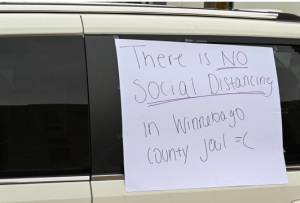 We need to think about movements in terms of relationships and collective power rather than an individualized effort. This philosophy is encapsulated well by the Chairman Fred Hampton’s quote “You can jail a revolutionary but you can’t jail the revolution.” We need to think about movement beyond reactive mobilizations lead by a few of charismatic personalities. Individuals can be jailed, corrupted, and change whereas collective power softens the blow the movement receives overall from poor leadership. Smaller scale actions should be planned with some tactical goals in mind. Radical spaces must stress the necessity of building infrastructure to explicitly support class revolt. Although there was a lot of education about racial capitalism and its relationship to the State over this summer, there has been little education on how to fight back against those systems strategically and effectively. Very few skill trainings were held and those that were only dealt with how to respond to State violence and not counter it. Revolutionaries who had experience organizing marches and rallies failed to share releveant skills with new comers. Without this skillsharing of expierence amoungst radicals in the city many newly politicized milatants were left developing necessary skills on their own. There was little thought about what actions could look like beyond marches to nowhere that ended inevitably in last stand arrests. We need to understand that revolutionary movements must be sustained over the course of lifetimes, not just weeks or months, but lifetimes. Understanding this need for longevity will make us understand the necessity for sustainable strategies to avoid burnout.
We need to think about movements in terms of relationships and collective power rather than an individualized effort. This philosophy is encapsulated well by the Chairman Fred Hampton’s quote “You can jail a revolutionary but you can’t jail the revolution.” We need to think about movement beyond reactive mobilizations lead by a few of charismatic personalities. Individuals can be jailed, corrupted, and change whereas collective power softens the blow the movement receives overall from poor leadership. Smaller scale actions should be planned with some tactical goals in mind. Radical spaces must stress the necessity of building infrastructure to explicitly support class revolt. Although there was a lot of education about racial capitalism and its relationship to the State over this summer, there has been little education on how to fight back against those systems strategically and effectively. Very few skill trainings were held and those that were only dealt with how to respond to State violence and not counter it. Revolutionaries who had experience organizing marches and rallies failed to share releveant skills with new comers. Without this skillsharing of expierence amoungst radicals in the city many newly politicized milatants were left developing necessary skills on their own. There was little thought about what actions could look like beyond marches to nowhere that ended inevitably in last stand arrests. We need to understand that revolutionary movements must be sustained over the course of lifetimes, not just weeks or months, but lifetimes. Understanding this need for longevity will make us understand the necessity for sustainable strategies to avoid burnout.
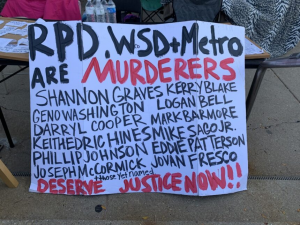 The Future
The Future
What does the future look like? Ultimately, the future is up to us. Through our conversations, we have generated a few ideas that we would like to see develop in the community and amongst revolutionaries in Rockford.
One of the most important things we feel that needs to happen in Rockford is a physical space for the movement to meet, strategize, learn, and build. We feel that a physical political center could provide a base for food distribution, a permanent zine distro, a library, a forum for radical speakers, movie screenings, potlucks and numerous other events. These types of events will allow us to develop the necessary relationships with the community. We hope to see this infrastructure to take root sooner than later. Infrastructure is something radical movements in Rockford need more than anything. In our discussion, we felt that creation of more food projects in the form of cooperatively owned farms and community gardens in our neighborhoods and surrounding areas could help build autonomy and stop us from relying on the State and Capital for our food.
We cannot stress enough that collectives, groups, organizations and affinity groups must develop strategies for accountability internally with the people involved. We would like to see the movement more willing to criticize and hold one another accountable. We have found that the lack of accountability around actions within these groups is a major problem. Internal to these groups, there must be some kind of way to relate to one another that is principled and creates cultures of accountability.
We hope to see the emergence of more organizing projects that are based in the neighborhood, workplace, and the home. Organizing in these areas will mean that we can fight back directly against class enemies such as bosses, the police, and landlords rather than symbolic protests which target city leaders who are mostly figureheads. Tenant unions and workplace unions are very needed here especially with evictions on the rise. While most workplace unions in the area tend to be very racist and entrenched in the Democratic Party, revolutionaries should focus on organizing distribution centers (for companies such as Amazon) which have become a common job in this area. A revolutionary movement necessitates the ability to disrupt and block capital.
Revolutionaries and militants must continue to form their own groups to build autonomous projects while coordinating with one another. We believe that communication between different groups and individuals could improve. A good way to do this would be to host a monthly spokes council meeting for Rockford abolitionists, anarchists, and revolutionaries. A spokes council is effectively a place to share ideas, upcoming actions, and plans. In the Rockford case, we feel it should not be a decision-making body but a place to share strategies and tactics.
There is a need for more community defense-oriented groups to emerge. In the midst of Back the Blue rally in Rockford, there was no formal anti-fascist formation to organize the opposition to that demonstration. It leads to the resistance against Back the Blue not being militant enough in our view. We need anti-fascist organizations and affinity groups. We hope that these community defense formations train in a variety of defense tactics against fascists which could range from unarmed combat to armed combat training. We need it all.
We’d like to see the movement to develop robust cultures of non-cooperation with this State. This means organized Copwatch programs and ICE watches. Rapid response networks to respond to police brutality, violence against queer people, domestic violence and ICE raids. These rapid response networks should be working alongside the community defense formations. Non-cooperation means robust anti-repression networks that support our comrades facing prison time for taking radical action against the State. This is gonna be important for us to support our comrades and everyone throughout the next year as they face charges for rebelling against the State.
Finally, we believe that it is deeply important for revolutionary movements in this city to develop revolutionary cultures. One way to do this is by commemorating revolutionary holidays. We could do this by doing community events/vigils/actions on revolutionary holidays such as Juneteenth, African Liberation Day or May Day. For instance, there was recently a call for NYE noise demo outside of a jail in Rockford. One of our comrades suggested that we should coordinate vigils or demos on birthdays of people murdered by the Rockford Police Department so that people in our community do not forget the violence of the State. We cannot stress enough that even small events that build radical community here are going to be essential for propelling larger mass movements.
We need to rise to the occasion to build our revolutionary movement here. Will we rise against the police and right-wing fascists and defend our community? What will you and your comrades do? What is the next step in your revolutionary practice?
Recommended Readings:
Let Empire Collapse: Why We Need a Decolonial Revolution by Mohamed Abdou
Notes from the Rockford Rebellion: Black Revolt in the Rustbelt from a New Afrikan Anarchist Perspective
Fire on Main Street: Small Cities in the George Floyd Rebellion by Shemon, Arturo and Atticus
The Combahee River Collective Statement by the Comahee River Collective
Communization and Decolonization by Ediciones Inéditas
For Anarchy, Not Anarchism by Ediciones Inéditas
16 Things You Can Do To Be Ungovernable by Indigenous Action
The Progressive Plantation by Lorenzo Kom’boa Ervin
Anarchism and the Black Revolution by Lorenzo Kom’boa Ervin






